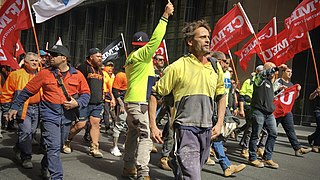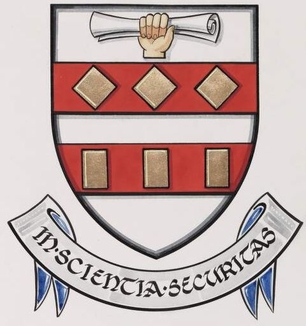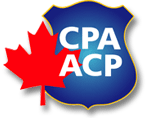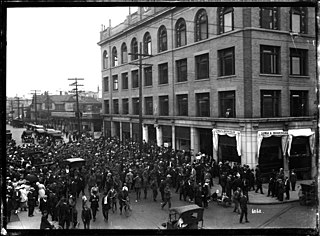Related Research Articles

Strike action, also called labor strike, labour strike, or simply strike, is a work stoppage caused by the mass refusal of employees to work. A strike usually takes place in response to employee grievances. Strikes became common during the Industrial Revolution, when mass labor became important in factories and mines. As striking became a more common practice, governments were often pushed to act. When government intervention occurred, it was rarely neutral or amicable. Early strikes were often deemed unlawful conspiracies or anti-competitive cartel action and many were subject to massive legal repression by state police, federal military power, and federal courts. Many Western nations legalized striking under certain conditions in the late 19th and early 20th centuries.
Collective bargaining is a process of negotiation between employers and a group of employees aimed at agreements to regulate working salaries, working conditions, benefits, and other aspects of workers' compensation and rights for workers. The interests of the employees are commonly presented by representatives of a trade union to which the employees belong. A collective agreement reached by these negotiations functions as a labour contract between an employer and one or more unions, and typically establishes terms regarding wage scales, working hours, training, health and safety, overtime, grievance mechanisms, and rights to participate in workplace or company affairs. Such agreements can also include 'productivity bargaining' in which workers agree to changes to working practices in return for higher pay or greater job security.

The Garda Síochána is the national police and security service of Ireland. It is more commonly referred to as the Gardaí or "the Guards". The service is headed by the Garda Commissioner, who is appointed by the Irish Government. Its headquarters are in Dublin's Phoenix Park.

Garda Síochána College is the education and training college of the Garda Síochána. It is located at McCan Barracks, Templemore, County Tipperary in Ireland. The college has been in Templemore since 1964.
In labor law, a union shop, also known as a post-entry closed shop, is a form of a union security clause. Under this, the employer agrees to either only hire labor union members or to require that any new employees who are not already union members become members within a certain amount of time. Use of the union shop varies widely from nation to nation, depending on the level of protection given trade unions in general.

The Canadian Labour Congress, or CLC is a national trade union centre, the central labour body in Canada to which most Canadian labour unions are affiliated.
The Canadian Union of Postal Workers is a public-sector trade union representing postal workers including letter carriers, rural and suburban mail carriers, postal clerks, mail handlers and dispatchers, technicians, mechanics and electricians employed at Canada Post as well as private sector workers outside Canada Post. Currently comprising upwards of 50,000 members, the Canadian Union of Postal Workers has historically been labeled as militant because of some of the actions undertaken since its inception in 1965 to help guarantee rights to all postal workers. According to former president Jean-Claude Parrot, "We succeeded to get the support of the membership because we earned our credibility with them...we got that reputation [of militancy] because we earned it."

The Canadian Police Association (CPA) is an advocacy and fundraising organization that is also a registered lobbyist with the Canadian government. The CPA represents Canadian police officers. It is divided into 27 regional chapters at municipal, provincial, and federal levels. Each of these chapters is represented by either a president or director.
The Special Detective Unit (SDU) is the main domestic security agency of the Garda Síochána, the national police force of Ireland, under the aegis of the Crime & Security Branch (CSB). It is the primary counter-terrorism and counter-espionage investigative unit within the state. The Special Detective Unit superseded the Special Branch, which itself replaced the older Criminal Investigation Department (CID), which was founded in 1921. They work in conjunction with the Defence Forces Directorate of Military Intelligence (J2) – Ireland's national intelligence service – on internal matters. The unit's headquarters are in Harcourt Street, Dublin City.

Labor relations or labor studies is a field of study that can have different meanings depending on the context in which it is used. In an international context, it is a subfield of labor history that studies the human relations with regard to work in its broadest sense and how this connects to questions of social inequality. It explicitly encompasses unregulated, historical, and non-Western forms of labor. Here, labor relations define "for or with whom one works and under what rules. These rules determine the type of work, type and amount of remuneration, working hours, degrees of physical and psychological strain, as well as the degree of freedom and autonomy associated with the work." More specifically in a North American and strictly modern context, labor relations is the study and practice of managing unionized employment situations. In academia, labor relations is frequently a sub-area within industrial relations, though scholars from many disciplines including economics, sociology, history, law, and political science also study labor unions and labor movements. In practice, labor relations is frequently a subarea within human resource management. Courses in labor relations typically cover labor history, labor law, union organizing, bargaining, contract administration, and important contemporary topics.

The Garda Public Order Unit – commonly known as the Garda Riot Squad – is a unit of the Garda Síochána, Ireland's police force, that deals with public disorder, including riots and protests.
Hotline.ie is recognised as the established illegal internet content reporting service in Ireland, especially for reporting child sexual abuse images. The service provides a secure and confidential environment where the public can anonymously report material they suspect to be illegal which they may encounter when using the Internet. The reports can be made using the secure https section within the website. Alternatively, reports can be made by email or by phone.

Law enforcement in the Republic of Ireland is the responsibility of Ireland's civilian police force, the Garda Síochána, commonly referred to as the Gardaí. It is responsible for all civil policing within the country and has been the only territorial police force since their merger with the Dublin Metropolitan Police in 1925.
A public-sector trade union is a trade union which primarily represents the interests of employees within public sector or governmental organizations.

Saskatchewan Federation of Labour v Saskatchewan [2015] 1 SCR 245 is a Canadian labour law case on the right to strike.
The National Police Federation (NPF) is the police union representing Regular Members and Reservists of the Royal Canadian Mounted Police (RCMP) below the rank of Inspector. The NPF represents about 20,000 RCMP Members serving across Canada and internationally.
The Garda Representative Association (GRA) is the staff association for police officers of the rank of Garda in Ireland, founded under statutory provisions. Irish law prohibits members of the Garda Siochana from joining trade unions because of a view from Government that police industrial action would pose a risk to public safety. The GRA is a 1978 reconstitution of a Representative Body for Guards (RBG) set up under 1962 regulations. Three similar organisations exist for Gardai of other ranks up to that of Chief Superintendent. As of March 2023, the association had a membership of almost 12,000. It is funded by a levy of 0.6% of the base salary of all its members.
The Association of Garda Sergeants and Inspectors (AGSI) is the statutory staff association for police officers of the ranks of Sergeant, Station Sergeant and Inspector in Ireland. Irish law prohibits members of the Garda Siochana from joining trade unions because of a view from Government that police industrial action would pose a risk to public safety. The AGSI is a 1978 reconstitution of a Representative Body for Inspectors, Station Sergeants and Sergeants (RBISS) set up under 1962 regulations. Three similar organisations exist for Gardai of other ranks up to that of Chief Superintendent. As of September 2023, the association had a membership of around 2,500. It is funded by a levy on its members. All Garda members of the appropriate ranks may apply to join.

Mounted Police Association of Ontario v Canada [2015] 1 SCR 3 is a leading Canadian labour law case concerning freedom of association under section 2(d) of the Canadian Charter of Rights and Freedoms. The Court concluded that the exclusion of Royal Canadian Mounted Police officers from unionization and collective bargaining was unconstitutional, overruling Delisle v Canada. Along with Saskatchewan Federation of Labour v Saskatchewan and Meredith v Canada , the decision in MPAO represented a significant evolution in the interpretation of section 2(d), clarifying the legal standard applicable under that provision.
References
- 1 2 3 4 5 6 7 8 9 10 11 Swanton, Bruce (1976-12-01). "Origins and Development of Police Unions in Australia". Australian & New Zealand Journal of Criminology. 9 (4): 207–219. doi:10.1177/000486587600900403. ISSN 0004-8658. S2CID 143660551.
- 1 2 Fleming, Jenny; Lafferty, George. "Police Unions, Industrial Strategies and Political Influence: Some Recent History". International Journal of Employment Studies. 9 (2): 131–140.
- ↑ "This Week in New Brunswick History" (PDF). gnb.ca. Government of New Brunswick. Retrieved 2 October 2023.
- ↑ "CPA Directory". CPA. nd. Retrieved December 27, 2017.
- ↑ Pennell, Josh (February 6, 2014). "Legitimate fundraiser resembles phone scam". The Telegram. Retrieved March 21, 2017.
- ↑ "Those "Study Sessions"". Montreal Gazette. 24 February 1967.
- ↑ Sancton, Andrew; Studies, University of California, Berkeley Institute of Governmental; Studies, University of California, Berkeley Institute of International (1985-01-01). Governing the Island of Montreal: Language Differences and Metropolitan Politics. University of California Press. ISBN 978-0-520-04906-2.
{{cite book}}: CS1 maint: multiple names: authors list (link) - ↑ "National Police Federation wins right to represent Mounties in collective bargaining Social Sharing".
- ↑ "National Police Federation Board Endorses Tentative Collective Agreement".
- ↑ "Airdrie joins AUMA campaign concerning RCMP Collective Agreement". highrivertimes.
- ↑ "SPJL – ammattilaisten edunvalvoja". Finnish Police Union . Retrieved 23 March 2020.
- ↑ "Review will recommend that gardaí can join trade unions". independent. 12 December 2016.
- ↑ Hennessy, Michelle (7 August 2016). "Factcheck: Is it illegal for gardaí to go on strike?". TheJournal.ie.
- ↑ Keane, Eddie (September 30, 2016). "Garda industrial action: Having been denied any leverage, GRA is breaking new ground". Irish Examiner.
- ↑ "Garda representative conference begins amid acrimony". The Irish Times.
- ↑ "Four members of Agsi national executive resign over governance concerns". The Irish Times.
- ↑ Brewer, John D.; Wilford, Rick; Guelke, Adrian; Hume, Ian; Moxon-Browne, Edward (July 27, 2016). The Police, Public Order and the State: Policing in Great Britain, Northern Ireland, the Irish Republic, the USA, Israel, South Africa and China. Springer. ISBN 9781349246472 – via Google Books.
- ↑ Brennan, Cianan (October 2016). "Looking back: Here's how things looked the last time the gardaí went on strike". TheJournal.ie.
- ↑ "Garda body considers legal action over block on union status". The Irish Times.
- ↑ "Airport staff picket SIPTU in unions row". independent. 21 December 2000.
- ↑ SIPTU Annual Reports 2013/14
- ↑ "National Public Service Act". Japanese Law Translation. Ministry of Justice, Japan. Retrieved 1 December 2022.